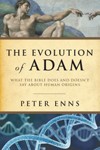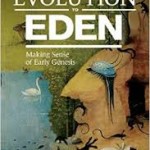Today I want to list (not discuss) some of the factors that have to be accounted for in building a compelling “model” of Adam in the Bible. If you want more details, you can either invite me to your house for a VERY expensive evening or you can wait for my book to come out.
The slide below reproduces the slide in my last post but in chart form. The three contexts we looked at are down the left column with some (by no means all) of the specific factors in the next two columns.
Remember, that for the pastor’s seminar where I gave this talk, my focus was not to judge between these issues (although I certainly expressed my opinions), but to lay out the types of things that I feel need to be considered.
Near Literary context of Genesis.
- A perennial issue is the presence of other human beings outside of the Garden (Cain’s wife and the people whom he fears will retaliate for his act of murder).
- The relationship between Genesis 1 and 2 (how does the creation of Adam relate to the creation of humanity in chapter 1?).
- The universal feel of the Adam story (Eve as mother of all living).
- The fact that only death is spoken of as an explicit consequence of Adam’s disobedience, not sin. (Commonly it is asserted that sinfulness as consequence is implied, which raises the question of why something so fundamental to the story of the fall is not mentioned.)
Near literary context of Paul.
- Romans 5:12 seems to say that death is the result of the sin of each individual, not the disobedience of Adam, which does not easily square with the rest of Paul’s argument in chapter 5.
- Paul seems clear in thinking of Adam as a real person whose disobedience led to universal death and sinfulness.
OT canonical context.
- The absence of any overt reference to Adam in the Old Testament after Genesis 5, save 1 Chronciles 1:1, seems significant.
- The parallels between Adam and Israel’s national history seem to be more than coincidental (both are exiled from a lush land for disobedience to law).
- Eve’s choice and Adam’s compliance to seek wisdom (knowledge of good and evil) apart from fearing the Lord (obeying his command) parallels the choice between wisdom and foolishness given in Proverbs.
- Eden is a well-known foreshadowing of Israel’s sanctuaries, which suggests that Adam is more an Israelite (priestly?) figure than the first human.
- Adam is certainly present typologically in the OT (e.g., Noah, Abraham, Moses are “new Adams”), but not in the way that Paul presents Adam, especially in Romans.
NT canonical context.
- Although Adam is mentioned elsewhere (the genealogy in Luke 3, 1 Timothy 2, and Jude 14), Paul alone speaks of Adam as the cause of sin and death.
Cultural context of Genesis.
- When Genesis was written is an extremely relavant factor discerning why it was written, i.e., what we are to expect Genesis to deliver when we read it.
- Ancient Near Eastern origins stories were ubiquitous in the ancient world, and the similarities and differences with Genesis must be accounted for.
- The question of Adam cannot be addressed in isolation from Genesis 1-11 as a whole and its ancient Near Eastern parallels.
Cultural context of Paul.
- Many Jewish writers near the time of Paul talked about Adam, but none of them considered Adam to be the cause of universal sinfulness, which suggests Paul’s reading is not obvious. Also, the diversity of “Adams” in Second Temple Judaism reflects the interpretive “flexible” of the Adam story.
- In keeping with his Jewish context, Paul’s use of the Old Testament in general is marked by a creative approach, centered on Christ, that is not bound to the meaning of the texts in their Old Testament contexts.
- Paul’s unique take on Adam seems to be driven by his mission to put Jews and Gentiles on equal footing before God. Appealing to Adam as he does helps Paul make the case of universal culpability before God. (As it is commonly put in the NT scholarly literature, Paul is arguing from solution to plight.)
Like I said, these are merely a partial list of factors that I feel need to be accounted for in any discussion of Adam. Although have my opinion, I am not implying that all these factors necessarily push you in one direction or another. And if you think there are other pressing matters, by all means comment on them below.
The main point in all of this is that Adam in the Bible is a long, intricate, and ongoing discussion. Slogans and bumpersticker arguments don’t help.











